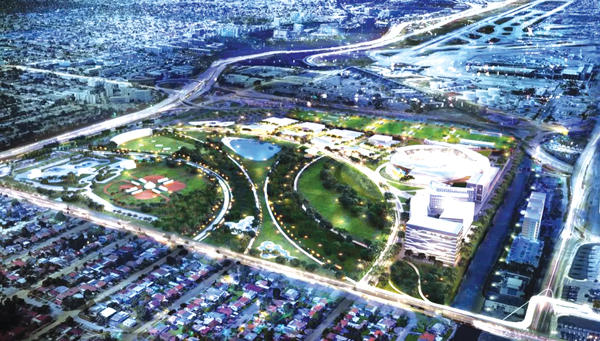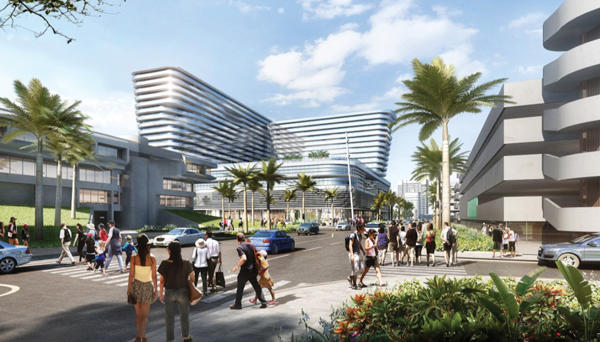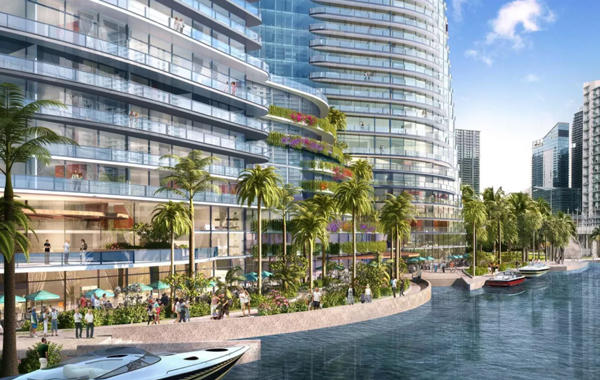 Miami Freedom Park soccer complex
Miami Freedom Park soccer complex
Developers: David Beckham, Jorge Mas and partners
After years of jumping around Miami for a site to build a multimillion-dollar Major League Soccer stadium, David Beckham and his partners will be asking City of Miami residents to approve their latest pitch.
Fueled by Jorge Mas and his brother Jose, the new ownership group is proposing a $1 billion mixed-use complex on about 73 acres of the Melreese Country Club site at 1400 Northwest 37th Avenue near Miami International Airport. In June, the Miami City Commission voted to place a no-bid proposal by Beckham and his partners for a ground lease and development agreement with the city on the Nov. 6 ballot.
The referendum proposal calls for a 99-year lease for the site and waives competitive bidding for the prime piece of city-owned property. As part of the agreement, the Beckham group would pay an annual rent of at least $3.6 million — or fair market value as determined by two independent appraisals — plus $20 million to fund a 58-acre public park’s construction, paid in annual installments of $666,667 for 30 years.
If the referendum passes, Miami Freedom Park, the entity building the project, would craft a final agreement with the city that would require approval from three-fourths of the City Commission.
The centerpiece of the complex would be a 25,000-seat soccer stadium home for Club Internacional de Fútbol Miami. The development would also include at least 1 million square feet of commercial space and at least 750 hotel rooms, 23 soccer fields and a football field.
Beckham’s ownership group also includes Sprint CEO Marcelo Claure. Before the Mas brothers joined late last year, Beckham planned to build the stadium in Overtown on an assemblage of 6 acres the group owned and 3 acres it was under contract to buy from the county.
What the opposition says:
Critics say the deal was rushed. In mid-August, a Miami-Dade Circuit Court judge dismissed the first lawsuit seeking to remove the question from the November ballot. The suit, filed by attorney William Douglas Muir, alleged the city didn’t follow competitive bidding procedures.
Activist Grant Stern has also said he plans to sue the city, claiming that it did not follow the Sunshine Law in the process, specifically in presenting the proposal to the public.
Objectors also include the vocal supporters of First Tee Miami, a golf program based at Melreese that serves underprivileged children.
Jorge Pérez, founder of the Related Group, spoke out against the proposal, arguing that the deal was rushed, the rent is too low and the community was not involved enough.
What happens next if approved:
Beckham’s group has largely stayed silent on its timeline, but its agreement with Major League Soccer requires that Beckham and his partners begin construction of the stadium by October 2019. If approved, the Melreese site still has to go through a number of hurdles — including environmental remediation, rezoning and city and voter approval, along with gaining Federal Aviation Administration height clearance. Remediation could take months.
 Miami Beach Convention Center Hotel
Miami Beach Convention Center Hotel
Developers: Team led by Jackie Soffer and David Martin
A development team led by Jackie Soffer and David Martin is hoping City of Miami Beach residents will vote yes on a deal that would put a hotel next to the newly renovated convention center.
The referendum marks the third time in five years that residents will vote on a similar project in the hopes of attracting major conferences and conventions. The latest proposal calls for a 99-year lease for the 2.6-acre site adjacent to the Miami Beach Convention Center and behind the Fillmore at the Jackie Gleason Theater.
Soffer and Martin’s team, which also includes Craig Robins’ Dacra, Arquitectonica, Meyer Davis Studio and Coastal Tishman, could spend up to $362 million on the project, using loans to finance 65 percent of the cost. The hotel would connect to the newly renovated convention center via a skybridge.
The deal calls for $16.6 million in rent to the city or a percentage of the revenues, whichever is greater. The developers would build up to 185 feet tall and 800 rooms.
What the opposition says:
Miami Beach Connect, led by Soffer and Martin, was the sole bidder for this latest proposal. The city put out a request for proposals in mid-May with a deadline about a month later.
About two years ago, Atlanta-based Portman Holdings tried for the second time to win approval for a 288-foot-tall convention center hotel, but the referendum failed to get the required 60 percent vote from residents.
Those opposed have been critical of the building’s height and impact on nearby traffic. Proponents argue that Soffer and Martin’s plan is being designed to resolve any traffic concerns and is about 100 feet shorter than Portman’s proposal.
What happens next if approved:
The development team said it hopes to break ground on the hotel next year. In a statement, a spokesperson for Miami Beach Connect did not respond as to what it would do if voters reject the plan, instead saying that the team is “100 percent focused on winning this November.”
 Miami Riverside Center
Miami Riverside Center
Developer: The Adler Group
In a less controversial move, the Adler Group is proposing a four-tower, mixed-use project with public amenities on the city-owned site of the Miami Riverside Center at 444 Southwest Second Avenue and the lot next door at 230 Southwest Third Street.
Adler’s Lancelot Miami River LLC is seeking a 99-year lease for the 3.15-acre Southwest Second Avenue site. Annual rent would be 3 percent of the entire project’s gross revenues, or $3.62 million a year with annual 1.5 percent increases.
The developer would also build a public riverwalk and a city administrative building totaling 230,000 square feet.
The residential, office and hotel development, designed by Nichols Brosch Wurst Wolfe & Associates, would feature about 37,000 square feet of retail space and a 1,000-space parking garage.
Adler is weaving in previous plans for a luxury rental project on the 1.6-acre site next door. The developer paid $14.25 million for the property in 2015, property records show. The project hasn’t garnered significant opposition since Adler won the city’s request for proposals in 2016.
What happens next if approved:
Adler plans to start building the city’s administrative building and workforce housing “immediately after approval,” according to a spokesperson. The residential component of the riverfront project is expected to begin after the city moves into its new building. Adler is considering using the Nexus property next door as the site for the city’s new building and rental housing project.
